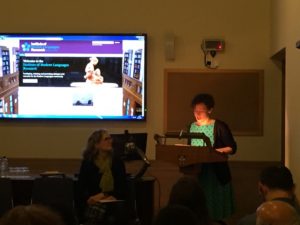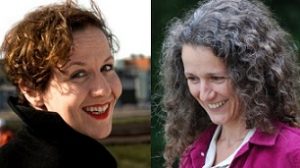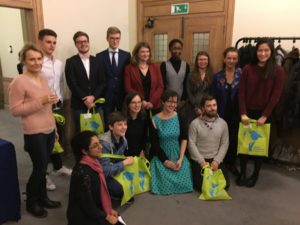For the third year in a row the IMLR, in cooperation with the DAAD and supported by the Goethe Institut and the Swiss and German Embassies, successfully hosted the prize-giving ceremony of this year’s German writing competition on 1 March in Senate House. Here Stephan Ehrig talks about the competition and awards ceremony:
At a time when the media has been full of heart-rending tales of human flight as well as heated debates on migration and the so-called refugee crisis, it seems all the more important to widen one’s perspective and empathise with the human destiny and personal stories behind the numbers. Consequently, for this year’s German writing competition the entrants were asked to continue storylines on themes of migration and flight, based on launchpad texts provided by German-speaking authors Anja Tuckermann (Berlin) and Ulrike Ulrich (Zürich).
Very much to the jury’s delight, the competition attracted a wide range of interest: of the 69 entries, 39 came from secondary school students and sixth-formers, and 16 from undergraduates, amongst several postgraduates, native speakers and others. The judges commented that submissions in all categories were surprising, touching, complex, and a joy to read.
This became clear during the awards ceremony in Senate House on 1 March which provided a great opportunity for all prize winners not only to meet the two authors but most of all to present their endings to a wider audience. Having already spent the afternoon in writing workshops with both authors, reading out their own texts certainly was the highlight of the evening. The range of creativity and linguistic skills was most impressive, and each author found their very own personal way of approaching the difficult task of seeing the world from a migrant’s or refugee’s perspective – a perspective that mostly was very far from their own experience – and on top of that in German. All prize winners mastered this difficult undertaking gracefully. Some of the texts displayed a variety of hopes and fears at the immigration desk, while others set out to confront the audience with the impossible demands refugees face when meeting their new neighbours who want to discuss their traumatic experience with them, at a time where this is the only thing they try to escape. Some texts describe the overpowering feelings and the impossibility of communication when one is only left with the fading image of what used to be home, “where my son follows the streams into the mountains and the horizon promises all or nothing.”
 The evening also gave the stage to Anja Tuckermann and Ulrike Ulrich who then read out their versions to the stories, and the surprising new endings to the plot left everyone excited that they had taken part in this literary and cultural endeavour. At the end of the evening, all participants were awarded various books for future encounters, and all organisers and supporters shared the uplifting sense of seeing so many (young) talents in Britain engaged in writing texts on such a difficult topic, and in a foreign language.
The evening also gave the stage to Anja Tuckermann and Ulrike Ulrich who then read out their versions to the stories, and the surprising new endings to the plot left everyone excited that they had taken part in this literary and cultural endeavour. At the end of the evening, all participants were awarded various books for future encounters, and all organisers and supporters shared the uplifting sense of seeing so many (young) talents in Britain engaged in writing texts on such a difficult topic, and in a foreign language.
Stephan Ehrig, Fellow in Modern Languages (Germanic/Central European), IMLR



